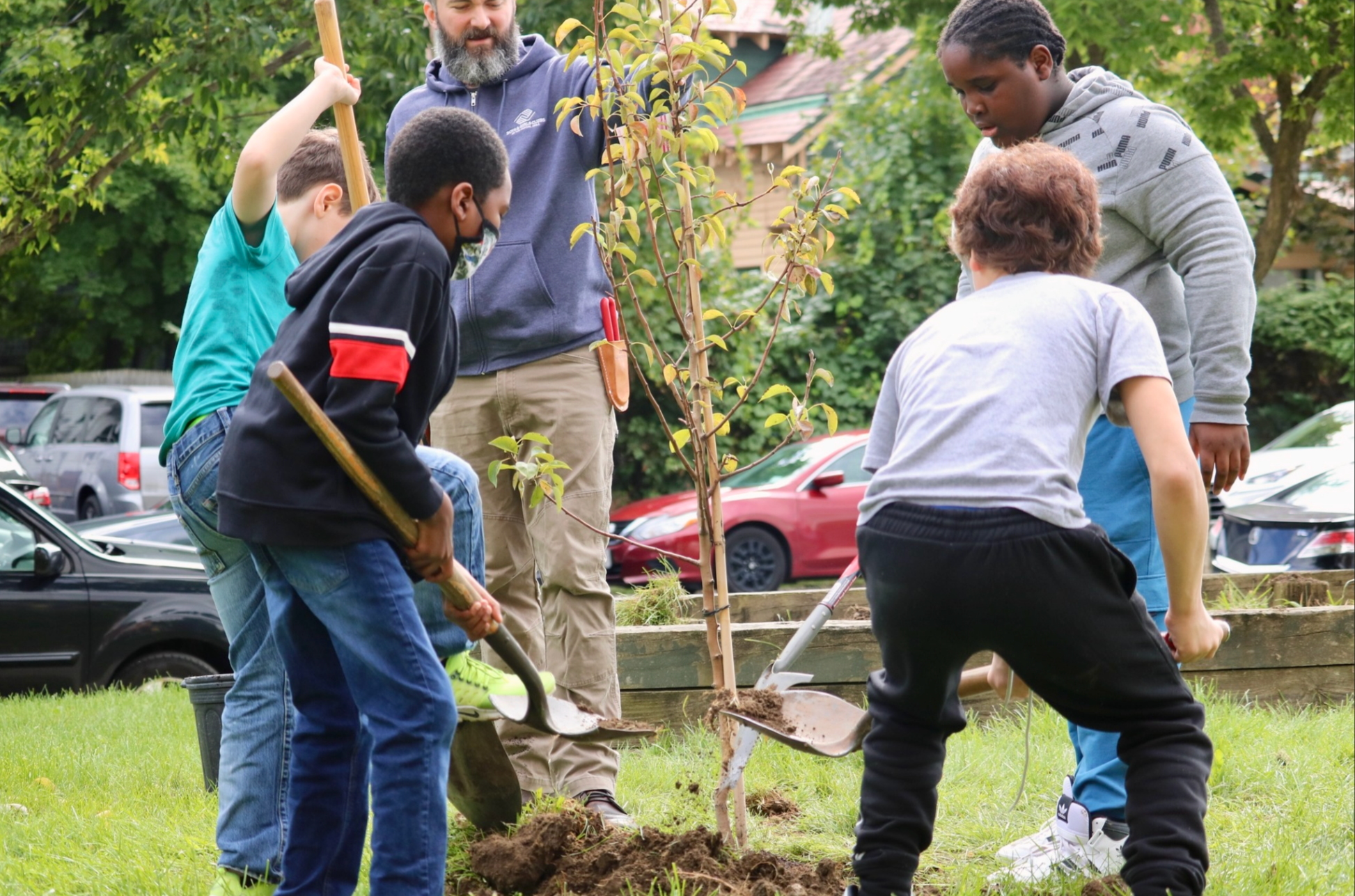Be the Change Spotlight: Vegetable Project
by Natalie Criscione
This story begins in the fall of 2009 with a row of garlic.
Picture it, if you will: a simple row of garlic…planted in a small patch of schoolyard…on a cold and windy Veterans’ Day…at Myers Middle School in Albany. The garlic is planted by a few people who have the beginnings of an idea about the wonderful experiences that could be offered in a school garden. Although it was, and still is, about those wonderful experiences, it has also grown into an idea about meeting the needs of students who are neither thriving nor engaged in their school environment, students who so often are economically disadvantaged.
Bill Stoneman was one of the volunteers that day. He was working on a teaching degree at the time and had recently begun what became a 13-year stretch as a substitute in Albany classrooms. He was pretty sure that the prospects for connecting with kids who felt like they were endlessly admonished to sit still and be quiet would be better met in a garden than a typical classroom. Since then, he has been building on that thought, meeting and getting to know struggling students, reading research that supports his early notion, and finding data that capture the difficulty that many schools have with disadvantaged students.
Today, Stoneman says, many students have an outsized need for spending more time outside, close to some semblance of nature, and can benefit enormously from teaching and learning that’s built around doing and touching and tasting and experiencing. “A garden is just as perfect a vehicle as there is for bringing all of that to kids,” he says.
While well-wishers often thank Vegetable Project volunteers for teaching students about where their food comes from, Stoneman says it’s more about helping kids get their feet on the ground, build coping skills, and navigate life’s challenges.
Neither Stoneman nor the other volunteers knew at the outset exactly where their efforts would lead. However, over the years, the fledgling school gardening outfit attracted attention from many individuals and organizations who offered ideas, know-how, and elbow grease. One of the first was Susan Fowler, a teacher at the Delaware Community School (now retired), who had been gardening with students there at her Friendship Garden since 1999.
“Susan gave us some long-handled shovels,” says Stoneman, “and said ‘welcome to the fold. Good luck.’”
And, as they say, the rest is history….
The Vegetable Project grew to become a tax-exempt non-profit organization with gardens and a school day classroom presence at both Myers and Albany High School that ushers outside as many as a 1,000 students each school year to touch, taste, sow, harvest, handle compost, dig, follow a key to identifying trees, tap maple trees, and prepare simple dishes. It has brought garden-related programming to eight other Albany schools and offers support and advice to garden initiatives at several schools. Scores of volunteers have cared for the gardens over the years, worked with kids, raised funds, and opened doors where they have connections. With an eye toward sustainability, the organization is now slowly building a team of part-time employees who work alongside the volunteers.
Vegetable Project volunteers have stories to tell that support the research and their own experiences. “My favorite,” says Stoneman, “is one that happens over and over again. It’s when we are outside and the teacher nods toward a student and whispers to me, ‘I haven’t been able to connect with that student one iota, and look at her now—so engaged. Amazing!’” For Stoneman, such conversations confirm what he knows: children in urban communities, who may seem disaffected or tuned out in the classroom, often respond differently and positively to nature. Getting kids outside amid greenery, where they feel wind on their faces and see bees buzzing around them, even for a brief 40-minute class period, benefits everyone. It is a field trip full of learning opportunities and positive experiences, without the need for parent permissions or expensive transportation.
As Vegetable Project team members maintain gardens and build pedagogy, they urge school and school district leaders and front-line educators to see outdoor opportunities for every classroom teacher, whether their students take direct advantage of the garden or just benefit from fresh air and a change of scenery.
Does this sound like something you would like to make part of your story, too? Volunteer opportunities abound. Contact The Vegetable Project through their website at https://vegetableproject.org/ for more information.
During the month of November, the Vegetable Project is one of the recipients for Honest Weight’s Be the Change Program. By rounding up to the nearest dollar every time you shop throughout the year, you become part of the change that makes the world better. And if you’re looking for amazing garlic (remember that row of garlic?), well, keep an eye out next September when Honest Weight stocks and sells the Vegetable Project’s annual harvest.
View all the Coop Scoop Blog posts here.


